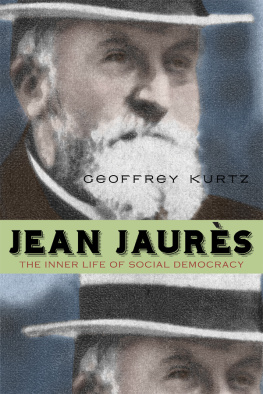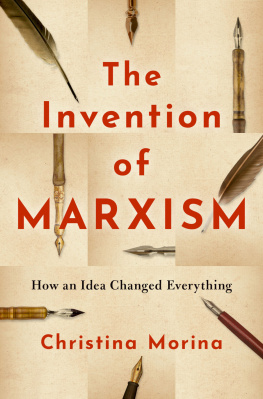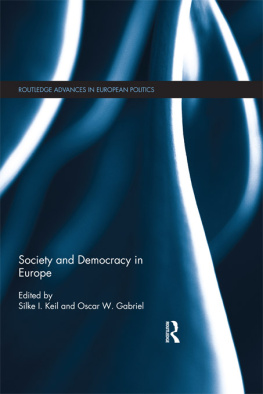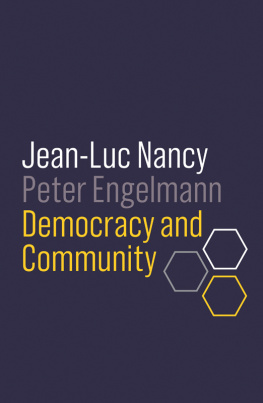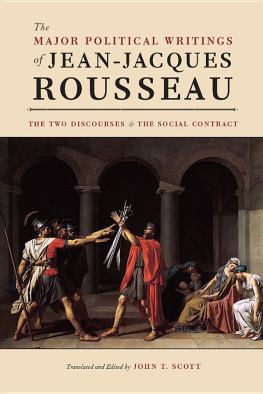GEOFFREY KURTZ
JEAN JAURS
THE INNER LIFE OF SOCIAL DEMOCRACY
The Pennsylvania State University Press
University Park, Pennsylvania
Library of Congress Cataloging-in-Publication Data
Kurtz, Geoffrey, 1974 author.
Jean Jaurs : the inner life of social democracy / Geoffrey Kurtz.
pages cm
Summary: A study in social democratic political theory that examines the writings of Jean Jaurs (18591914), the parliamentary and philosophical leader of French socialismProvided by publisher.
Includes bibliographical references and index.
ISBN 978-0-271-06402-4 (cloth : alk. paper)
1. Jaurs, Jean, 18591914Political and social views.
2. SocialismHistory.
I. Title.
HX264.7.J38K87 2014
320.531092dc23
2014009217
Copyright 2014 The Pennsylvania State University
All rights reserved
Printed in the United States of America
Published by The Pennsylvania State University Press,
University Park, PA 16802-1003
The Pennsylvania State University Press is a member of the Association of American University Presses.
It is the policy of The Pennsylvania State University Press to use acid-free paper. Publications on uncoated stock satisfy the minimum requirements of American National Standard for Information SciencesPermanence of Paper for Printed Library Material, ANSI Z 39.481992.
This book is printed on paper that contains 30% post-consumer waste.
FOR Alyson
CONTENTS
My work on this book was supported by a Borough of Manhattan Community College (BMCC) Faculty Development Grant (2008) and by two Professional Staff CongressCity University of New York (PSC-CUNY) Research Awards (2008 and 2009). I presented parts of my research at a 2011 Faculty Salon held by BMCCs Department of Social Sciences and Human Services and at the New York Political Science Associations 2012 meeting, and I benefited from discussions at both events. I would like to acknowledge Logos: A Journal of Modern Society and Culture for publishing Jean Jaurs: A Portrait (2006) and New Political Science for publishing A Socialist State of Grace: The Radical Reformism of Jean Jaurs (2006) and An Apprenticeship for Life in Common: Jean Jaurs on Social Democracy and the Modern Republic (2013).
Reading and writing about Jaurs has been part of my life for more than a decade now, and during that time many people have contributed to this project. I am grateful to all the teachers, colleagues, neighbors, comrades, friends, and family members who have guided and supported me in this period. I would like to acknowledge by name the following people who played a part in the making of this book. My thanks go to each of them.
Early in my graduate studies, Stephen Eric Bronner extracted from me a promise to turn a short paper on Jaurs into something publishable. Although I now consider that obligation discharged, my intellectual debt to Steve remains, and I am happy to acknowledge it.
The staff at Pennsylvania State University Press, most notably, my editorsSanford Thatcher at the beginning of the process and Kendra Boileau at the middle and endshepherded this book to print with patience and forbearance. Copy editor Jeffrey H. Lockridge pushed me to sharpen my argument, improving the text tremendously. Michael Forman and Leslie Derfler reviewed an early version of the manuscript for the Press, and two anonymous reviewers commented on a later version.
Dorothea Coiffe and other librarians at BMCCs A. Philip Randolph Memorial Library provided indispensable help. The staff and librarians at the New York Public Librarys Stephen A. Schwarzman Buildingespecially Jay Barksdale, liaison for the Allen Room and the Wertheim Studymade it possible for me to read and write in beautiful places.
Over the past few years, I have been shaped by an intellectual and political community in and beyond New York. Many of that communitys members have influenced or supported this book through conversations or correspondence (sometimes without knowing so, and sometimes despiteor throughtheir disagreements with the ideas I present here). Among them, I would particularly like to thank Kate Bedford, Melissa Brown, Mark Engler, K. E. Saavik Ford, Roger Foster, Brian Graf, Andrew Greenberg, Kristy King, Jacob Kramer, Daraka Larimore-Hall, Penny Lewis, James Mastrangelo, Charles Post, Joseph M. Schwartz, Jessica Shearer, Nichole Shippen, and Michael J. Thompson. OthersMatthew Ally, Michael Rabinowitz, and Brian Stipelmanalso offered helpful comments on sections of the manuscript. I thank Matthew in particular for his questions about Jaurss first doctoral thesis, which steered me away from a number of serious errors.
I have benefited continually from the gracious generosity of my family: Wayne and Kathleen Kurtz, Jeremy and Stefanie Kurtz-Harris, Deborah and Mark Andstrom, and (smallest but not least) Miriam, Lewis, and Ginger. If ever I doubted that we are born and remain dependent on those who love us, writing this book has taught me all over again that this is so.
My wife, Alyson Campbell, has done more than any other person to make this book possible, from commenting on drafts of the manuscript to answering questions about French, to patiently performing the practical work of partnership, to showing me what it is to be a citizen, to having more confidence than I often had that the project would eventually be finished. I dedicate this book to her.
For works by Jean Jaurs cited frequently, I use the following abbreviations. Translations from these texts are my own. I have retained Jaurss fully capitalized words within quotations as well as his italics except where doing so would require putting an entire quotation in italics.
AN | Lorganisation socialiste de la France: Larme nouvelle. Paris: LHumanit, 1915. |
HS | Histoire socialiste, 17891900. 13 vols. Edited by Jean Jaurs. Paris: Jules Rouff, 19018. |
OJJ | Oeuvres de Jean Jaurs. 9 vols. Edited by Max Bonnafous. Paris: Rieder, 193139. |
PTA | Philosopher trente ans. Vol. 3 of Oeuvres de Jean Jaurs. Edited by Annick Taburet-Wajngart. Paris: Fayard, 2000. |
TAD | Les temps de laffaire Dreyfus, novembre 1897septembre 1898. Vol. 6 of Oeuvres de Jean Jaurs. Edited by ric Cahm and Madeleine Rebrioux. Paris: Fayard, 2000. |
A certain questions asked by that generation, questions that might profitably be asked again by those who would like to see a democratic Left in the twenty-first century that is able to preserve and extend the best of what the twentieth-century Left achieved.
The story of social democracys outer life is well known.modern society made fit for human habitation.
When I describe social democracy as a
This history and these orienting commitments are what make liberal republicanism) did not allow for an adequate account of their circumstances or their activities, and that they would need a new understanding of political life. That would have been challenge enough, but they also foundand this is what we are less likely to rememberthat they had to reflect on the inner life of their movement.
This was no simple thing to do. For the first generation of social democrats, committing themselves to the practice of democratic politics meant abandoning the extravagant expectations that had oriented the nineteenth-century Left. Utopia, revolution, unbounded progresswhat happens when these ideas lose whatever plausibility they may once have had? If the daily work of the socialist movement was not to be seen as a series of steps on the road to a wholly new and fully just society, what reason could the movements members have for making the sacrifices demanded by political life? If a final victory was not written into the trajectory of history, what could make participation in the movement worthwhile? What would bind the movement together? The early social democrats seem to have been surprised by the urgency of these questions, and some members of that first social democratic generation tried harder to think through the problems of their movements inner life than their descendants would in the period when social democracy moved from success to success. Building a movement, the first social democrats were haunted by the problem of hope.

